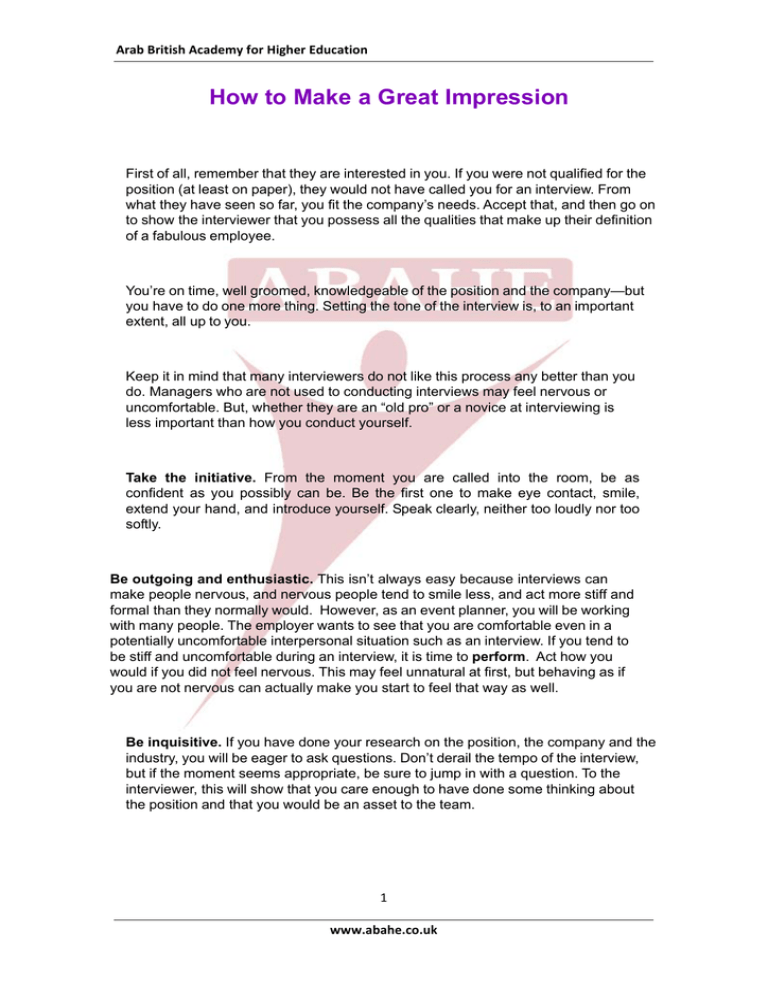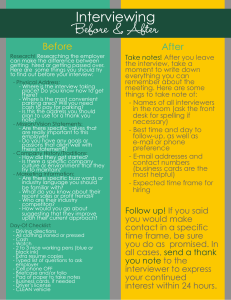
Arab British Academy for Higher Education How to Make a Great Impression
First of all, remember that they are interested in you. If you were not qualified for the
position (at least on paper), they would not have called you for an interview. From
what they have seen so far, you fit the company’s needs. Accept that, and then go on
to show the interviewer that you possess all the qualities that make up their definition
of a fabulous employee.
You’re on time, well groomed, knowledgeable of the position and the company—but
you have to do one more thing. Setting the tone of the interview is, to an important
extent, all up to you.
Keep it in mind that many interviewers do not like this process any better than you
do. Managers who are not used to conducting interviews may feel nervous or
uncomfortable. But, whether they are an “old pro” or a novice at interviewing is
less important than how you conduct yourself.
Take the initiative. From the moment you are called into the room, be as
confident as you possibly can be. Be the first one to make eye contact, smile,
extend your hand, and introduce yourself. Speak clearly, neither too loudly nor too
softly.
Be outgoing and enthusiastic. This isn’t always easy because interviews can
make people nervous, and nervous people tend to smile less, and act more stiff and
formal than they normally would. However, as an event planner, you will be working
with many people. The employer wants to see that you are comfortable even in a
potentially uncomfortable interpersonal situation such as an interview. If you tend to
be stiff and uncomfortable during an interview, it is time to perform. Act how you
would if you did not feel nervous. This may feel unnatural at first, but behaving as if
you are not nervous can actually make you start to feel that way as well.
Be inquisitive. If you have done your research on the position, the company and the
industry, you will be eager to ask questions. Don’t derail the tempo of the interview,
but if the moment seems appropriate, be sure to jump in with a question. To the
interviewer, this will show that you care enough to have done some thinking about
the position and that you would be an asset to the team.
1 www.abahe.co.uk Arab British Academy for Higher Education Talk about the job at hand. All too often, our experts tell us that prospective
employees spend too much time asking about promotions and management
positions when they should be discussing the job they’re under consideration for.
Focus on what value you would bring to the company as an employee, and not on
what you want to get from the job. For example, don’t discuss how much vacation
time you want or bring up salary until the employer does.
Be assertive but not aggressive. The company probably has more than its share
of “yes people” and people who just coast along. If the opportunity avails itself, don’t
hesitate to express your opinion on a work-related issue or concern. Taking the
initiative to broach a subject with confidence will show your leadership potential and
will underscore your confidence and ease with others.
Be positive. Avoid saying anything negative, especially about former employers.
Also avoid saying anything negative about yourself, which some applicants do by
sounding as if they are desperate for a job. Before the interview, remind yourself
how much you have to offer an employer, and that there are many opportunities
for you. Believe that if this particular job doesn’t work out, there is something better
out there for you.
Exude confidence, poise, leadership, and capability. Chances are, you’ll get that
second interview—and your dream job!
All Rights Reserved © Arab British Academy for Higher Education 2 www.abahe.co.uk




